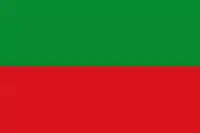Agrarian Party of Russia
The Agrarian Party of Russia (APR; Agrarnaya Partiya Rossii, Аграрная Партия России, АПР) was an agrarian political party in Russia. Founded in February 1993, it was among the earliest parties in the Russian Federation.
Agrarian Party of Russia Аграрная партия России | |
|---|---|
.svg.png.webp) | |
| Abbreviation | APR (English) АПР (Russian) |
| Leader | Olga Bashmachnikova |
| Founder | Mikhail Lapshin |
| Founded | February 26, 1993 (first APR), May 2, 2012 (second APR) |
| Dissolved | September 12, 2008 (first APR), October 21, 2019 (second APR) |
| Merged into | United Russia (2008-2012) |
| Headquarters | 20th Building, Bolshoy Golovin Lane, Moscow, Russia |
| Newspaper | Russian land |
| Youth wing | Russian Agrarian Youth Union |
| Membership (2008) | 164,089 |
| Ideology | Agrarianism Agricultural policy Centrism Before 2009: Agrarian socialism Collectivism |
| Political position | Centre to centre-left Before 2009: Left-wing |
| National affiliation | All-Russia People's Front (one-half) Russian Ecological Party "The Greens" (one-half) |
| Colours | Green Red Yellow |
| Slogan | "Strong Agrarians — Powerful Power" (Russian: "Сильные аграрии — Мощная держава") Before 2009: "Peace and bread to every home!" (Russian: "Мир и хлеб — каждому дому!") |
| Anthem | Russian land, We will not forget You |
| Seats in the 1st State Duma | 37 / 450
|
| Seats in the 2nd State Duma | 20 / 450
|
| Seats in the 3rd State Duma | 11 / 450
|
| Party flag | |
 | |
| Website | |
| agroparty.ru | |
.JPG.webp)
History
The Agrarian Party of Russia was founded on 26 February 1993, by the head of the Altai Republic, Mikhail Lapshin and Vasily Starodubtsev, governor of the Tula region and former member of the USSR's State Committee on the State of Emergency. During their leadership (1993-2004), the party made an alliance with the Communist Party of the Russian Federation (CPRF) and the Fatherland – All Russia bloc. Until 2008, the party supported agrarian socialism[1] and collectivism.
Founder Mikhail Lapshin led the party until 2004; its most recent leader was Vladimir Plotnikov. In the legislative elections in December 1993, the Agrarian Party obtained 37 seats in the Duma and won 8% of the popular vote. Between 1994 and 1996, one of its party members, Ivan Rybkin, was the speaker of the Russian Parliament. In the legislative elections in December 1995, the APR did not make it over the 5% threshold, obtaining only 3.78% of the votes. In the legislative elections on 7 December 2003, the party won 3.6% of the popular vote and three out of 450 seats in the parliament.
Agrarian Party member Nikolay Kharitonov ran as a presidential candidate from the Communist Party of the Russian Federation in the 2004 Russian presidential election and won 13.7% of the votes, coming out second to Vladimir Putin.
In the 1990s, party deputies were usually allies of the Communist Party in the State Duma and advocated for greater government support for the agricultural sector.
The party won 2.30% of the votes in the 2007 elections, did not break the 7% barrier, and thus, had no seats in the Duma.
The Agrarian Party supported the candidacy of Dmitry Medvedev in the 2008 Russian presidential election. It later merged with United Russia—the party that currently holds the most seats in the Duma.[1]
Refounding
The year 2012 marked an especially notable period for the party as it was officially restored, and the registered leader Olga Bashmachnikova was elected Executive Director of the Agricultural Association on May 18. This led the party to take a new direction, moving away from the ideologies of agrarian socialism and collectivism towards centrism. The party has abandoned the Alliance with the Communist Party of the Russian Federation (CPRF), which was in the union since its foundation. The APR is currently united with the People's Front for Russia and the Russian Ecological Party "The Greens".[2]
According to the results of the elections of 2012, 2013 and 2014, the party failed to win in regional and city parliaments.
On October 21, 2019, the Supreme Court of Russia, following a lawsuit by the Ministry of Justice, liquidated the party for insufficient participation in the elections for 7 years.[3]
References
- Nordsieck, Wolfram (2008). "Russia". Parties and Elections in Europe. Archived from the original on 9 April 2009.
- The program and Charter of the Agrarian Party of Russia on the website of the Ministry of Justice of Russia
- Decision of the Supreme Court of the Russian Federation No. AKPI19-796 of October 21, 2019